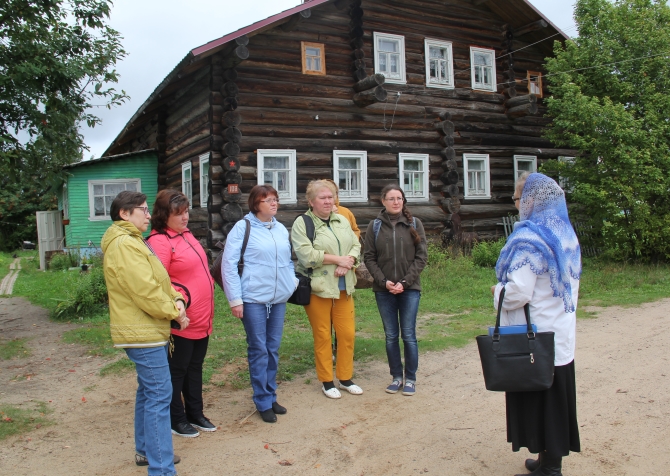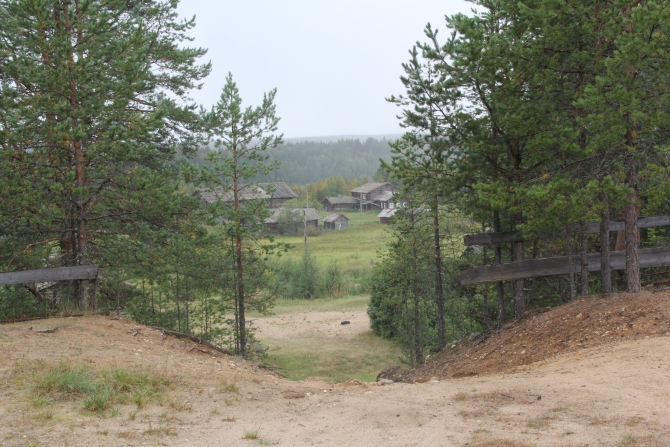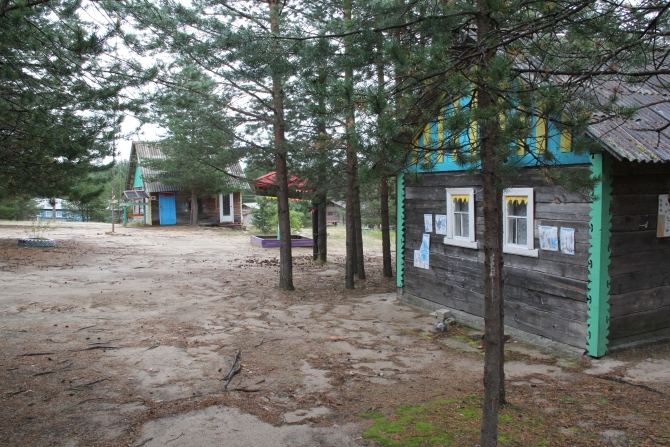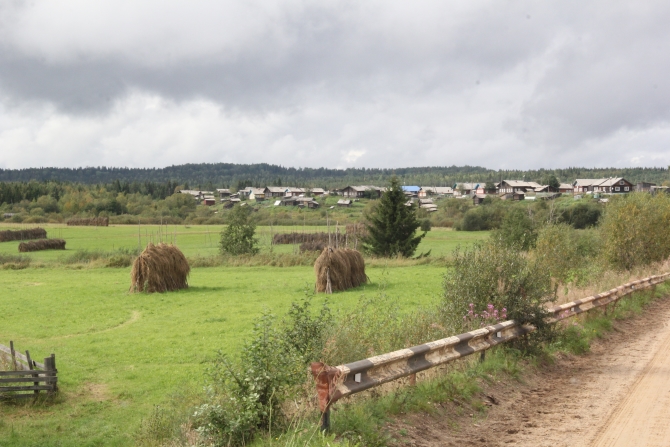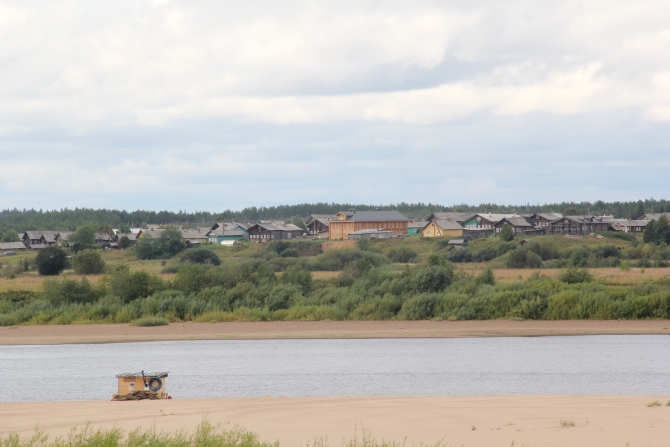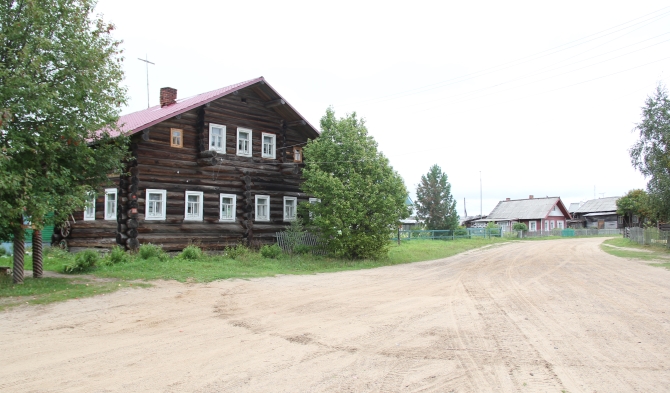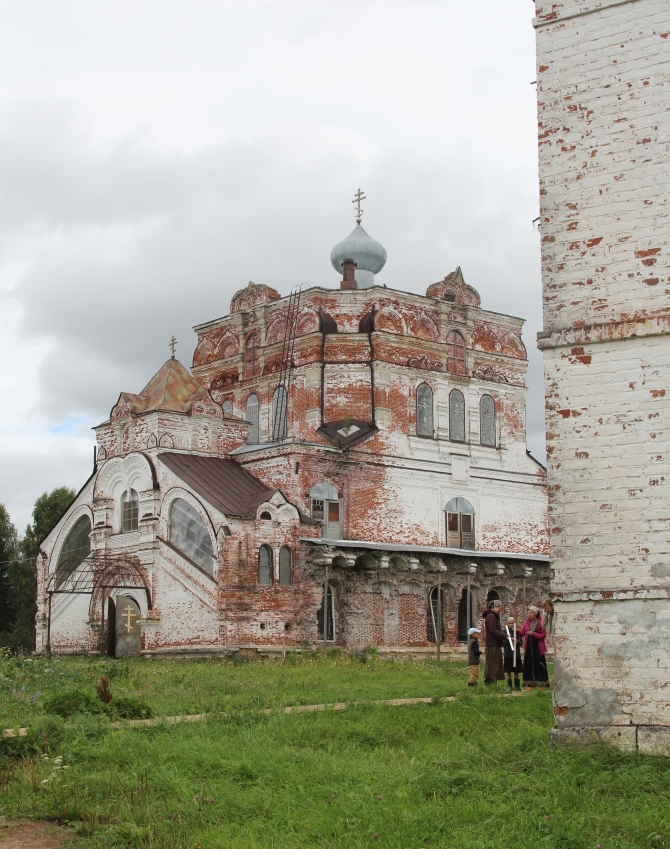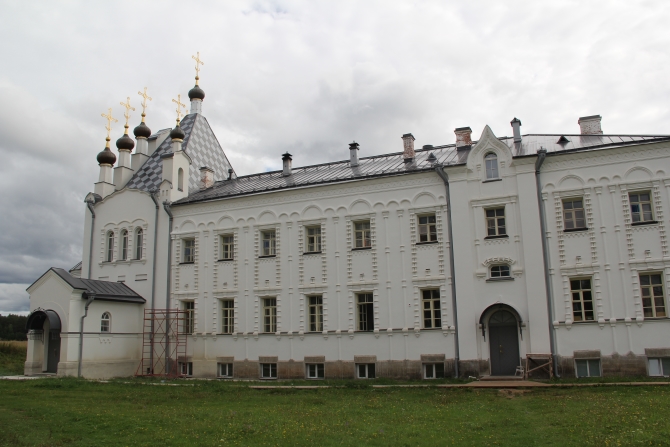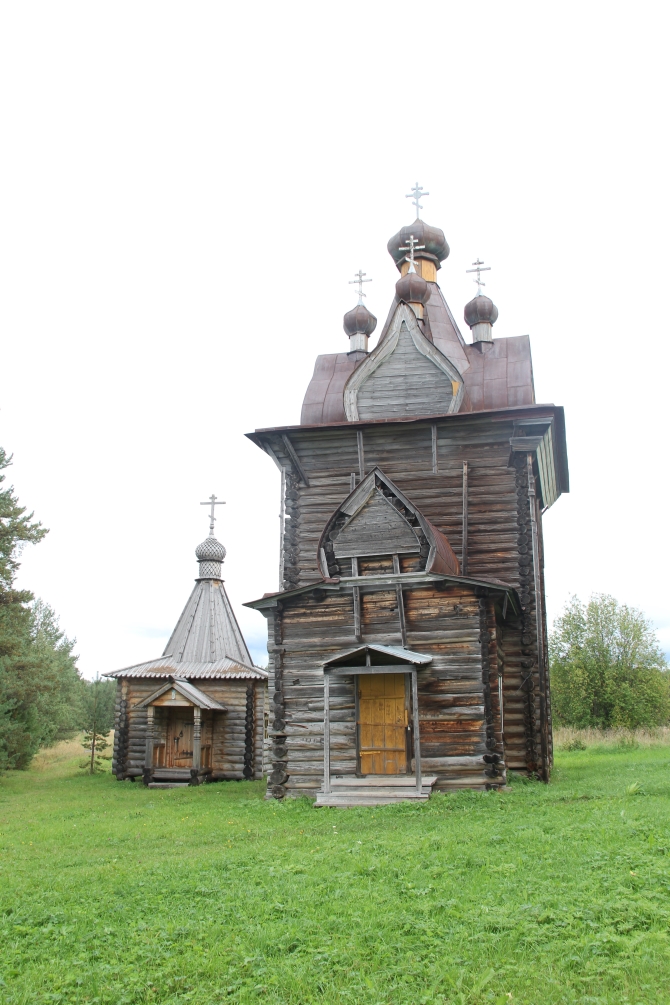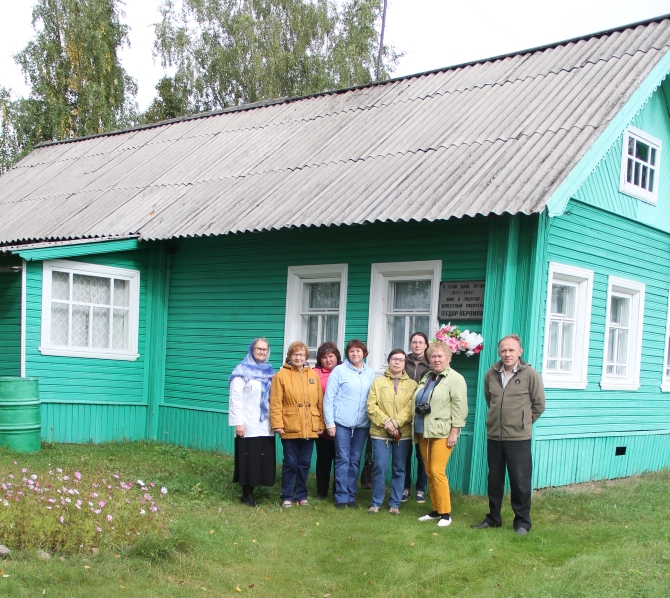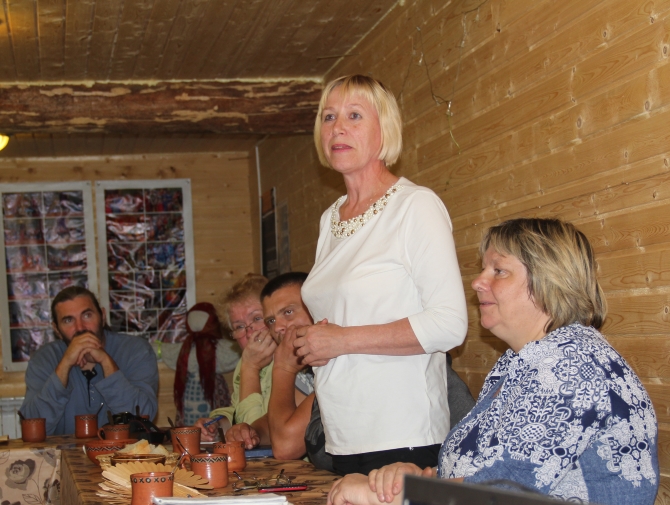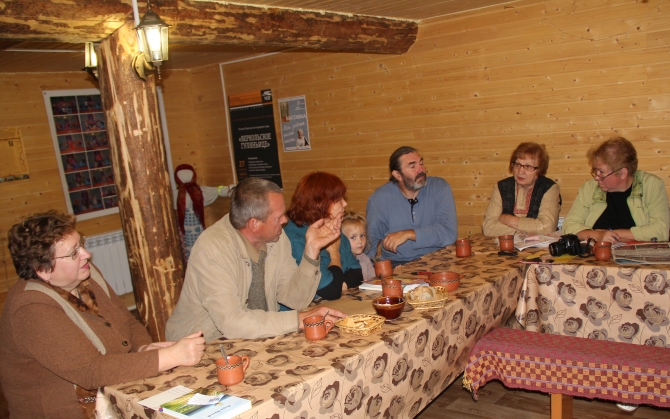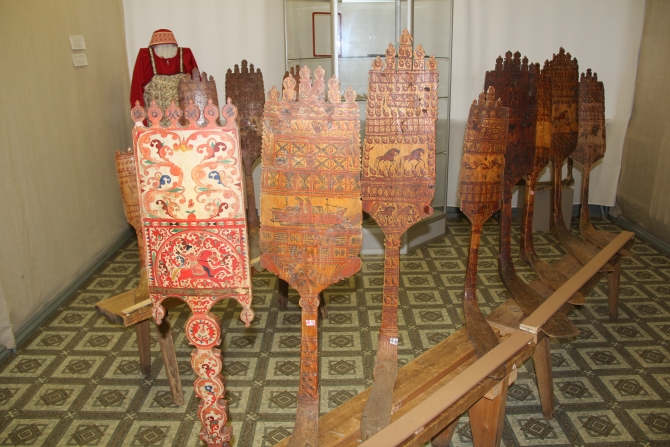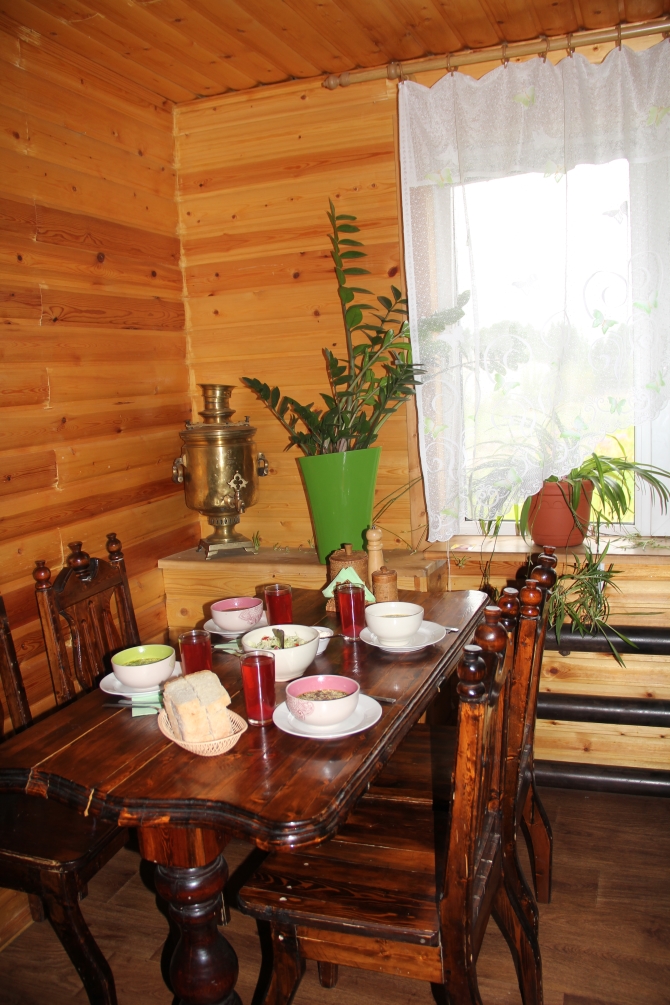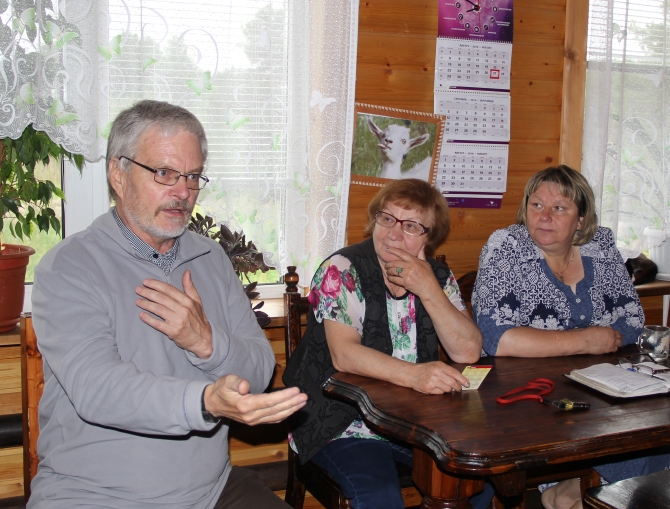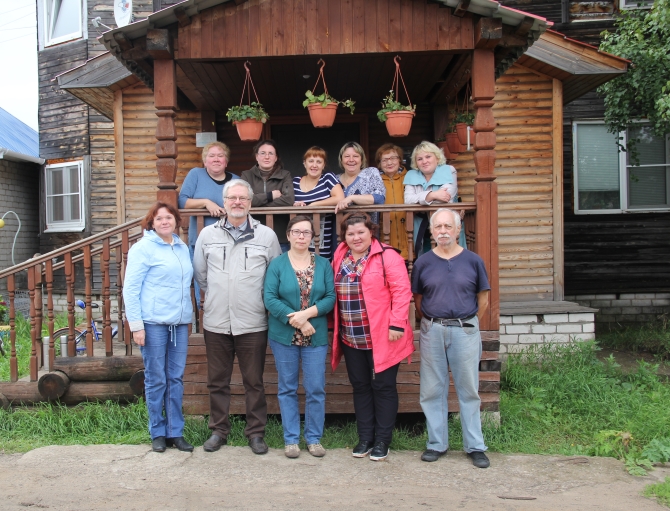Developing Cooperation Is a Win-Win Solution for Both Districts
A group of Udora residents interested in rural tourism development in own district visited some villages along the Pinega river in Pinega district of the adjacent Arkhangelsk region, where rural area development has long been associated with the local initiatives support and rural tourism promotion.
With own eyes
The participants of the three-day exploratory trip as part of the Model River Mezen project had a glimpse of the health improvement schoolchildren camp in Kuchkas, visited the country life museum in Nyukhcha, saw the community museum, guesthouses and other components of the local tourism product in the villages of Sultsa and Gorodetsk.
The trip participants were particularly impressed by Verkola, the native village of Fyodor Abramov, a famous Russian novelist. It was not only about the tourism potential of the village where each house is inhabited by characters of Abramovs’s books, and right across the river you see the St. Artemius of Verkola monastery, a hub of the Russian spiritual culture. It was also about the people – Verkola residents – who managed to unite behind the idea of the village’s cultural heritage preservation and find the potential for its further development.
Tatyana Sedunova, a sole proprietor, plays a significant role here. Owing in many ways to her energy, managerial skills and personal abilities tourism started growing in the district two decades ago. As a deputy of the Arkhangelsk Regional Board of Deputies, deputy head of its culture and tourism committee and member of the respective expert council, she is still in the thick of rural things. Eighteen months ago Tatyana accepted our invitation and took part in a two-day seminar for tourism facilitators and owners of guesthouses in Udora district. This time, these were Udora dwellers who got an opportunity to learn about the experience of the neighboring district in real life, rather than from stories and presentations.
Almost every village by the Pinega has own guesthouses. The tourism potential, however, varies. Still, it is right to say that you can add zest to a place so as it would attract tourists. In the Nyukhcha village, for instance, the flavor is added by the history of the Chuds – that is how the village with its past and its indigenous people is presented in the local country life museum At Lukeya’s (the founder of the museum – S. Grigoryev). The district can also boast of the tourist route Reserved Chuds. Another peculiarity that attracts local children is the Fairytale Pinega route passing through eight villages of the district, with each of them having own fairytale character who you can talk to and play with.
Karpogory, administrative center of the district, has a folk art center, one of the first of the kind in Arkhangelsk region. Both grown-ups and kids can obtain various traditional craft skills – weaving, patchwork, carving, wood painting, etc. What makes this facility interesting for the tourists is that it houses unique collections and holds most interesting exhibitions. The visitors from Udora, for example, could see all possible variants of the traditional Pinega costume and the richest collection of spinning wheels decorated with the Mezen painting, which makes it possible to trace the way of the most archaic and unusual of all types of painting, with its origin still remaining unknown, into the neighboring districts. However, it is known for certain that the old art was reborn in Palashchelye beside the Mezen and later was spread to the Northern Dvina, Pinega, Pechora, Onega….
Another fact worth to mention is that the Folk Art Center has a tour guide among its staff who deals with visitors and locals both at exhibitions in the Folk Art Center and during tourist routes in the district in cooperation with the local amateur historians.
The group of visitors from Udora saw another unique place in Karpogory – the family museum of Viktor Merzly, a local resident. The museum’s facilitator impressed the guests with the diversity of his interests and knowledge, with the abundance of showpieces, and more than that – with the museum know-how, scientific approach to collecting and housing of exhibits and to presenting the material.
Useful talk at round table
The round table held at Tatyana Sedunova’s guesthouse in Verkola was dedicated to building cooperation of all stakeholders – local businesses, rural libraries, museums, other cultural institutions, as well as orthodox community, local enthusiasts and village residents, and the way such cooperation contributes to rural tourism development. The visitors from Komi were interested in the Pinega residents’ experience. According to the past year statistics, two thousand tourists visited Mrs. Sedunova’s guesthouses and walked the local routes. This value has been already reached this year, so three thousand people are expected to have visited local sights by the end of the year, as in the short period from May to August the area hosted almost 800 visitors! Pinega district, by the way, has one more forest hotel – Golubino – in addition to Tatyana’s guesthouses, and it never stays empty. Moreover, there are other guesthouses in the district… What’s more, many people visit museums of the district as well…
In other words, a rural district in Komi can hardly boast of such figures. Why such results? Who comes to this remote area and what places do they come from? What benefits does it provide to the locals and doesn’t it deprive them of the originality that attracts residents of big cities? During the round table many of such questions were responded. By the way, such knowledge and experience exchange was mutual, as Verkola dwellers were shown presentations about Komi. They were told about Udora district and the Udora Necklace tourist route, the Bushenev family’s guesthouse and the public museum of the Syolyb village, the activities of the Udora branch of the Komi Voytyr interregional public movement, the Silver Taiga Foundation’s work and support of local initiatives under the Foundation’s projects…
Owing to the local participants of the round table the information obtained through meetings and tours was enriched by new interesting facts that built well into the tourist map already shaped in the visitors’ minds.
About event tourism
Visitors from Komi learnt, for instance, that Verkola annually holds a summer festival They Stack Hay in Pekashino, with local bands singing and performing, and visitors from all over the region and other regions taking part in various events, exchanging new editions in the reading lounge, competing in mowing and making circlets of field flowers, participating in hay turning and stacking workshops…
Another idea – of a youth festival – is also being implemented in Verkola. It all started four years ago when friends and fans of Aleksey Alin, who used to work at the museum of F. Abramov, a talented photographer and cameraman, decided to arrange a festival in his honor. A lot of guests, including the young, came to take part, and the following year everyone expected another festival like that one. So, one more local peculiarity, the open creative festival Verkola Primroses, came to life alongside with new opportunities for event tourism development. The festival topics differ from year to year. The most recent one was devoted to the art of cinema (2016 was officially announced to be the Year of Russian Cinema in this country), with films, concerts and meeting actors at festival grounds…
Verkola residents turned out to be more than just cinemagoers – twenty years ago local people played in the movie V Toy Strane (In That Country) filmed there. Films after Fyodor Abramov’s books relate closely to the village as well… Actors from the Maly Drama Theater together with Lev Dodin, its director, visited the village twice, so the play Brothers and Sisters by Fyodor Abramov, once famous all over the world, was restored on stage with the new young company.
“It is important to make the festival profitable, as we see tourism as an opportunity for the area development”, says Olga Alina, a local librarian, one of the drivers of the festival. “At first it just united soul mates. This year there were over 120 guests from Arkhangelsk only. It is becoming known, and it is almost fully our own initiative, because we hardly get any funds from the district budget. The first experience was successful owing to sponsors and enthusiasts. On the fourth year we broke even, so there were no losses. Verkola needs the festival, and we will proceed, we want to make it more than just demanded by our hearts and souls, but also profitable”.
About enthusiasts, local initiatives and governmental support
Olga Alina is one of such enthusiasts. Thirty-five years in the library could not make a bookworm of her, she has never tried to hide from life behind the book covers. Olga is sure that “a library is a place for discoveries”, so her tool kit has lots of interesting and attractive things for tourists as well. It includes various workshops with the involvement of local craftsmen and craftswomen, the entertainment program Games of My Childhood, which suddenly became very popular, unveiling of another famous Verkola dweller – Konstantin Voronitsyn, inventor scientist, two-time winner of the State Award of the USSR, who did a lot for the forestry sector of the country – for the young generation… By the way, it was thanks to the local community board that a memorial sign to the outstanding fellow countryman was placed in front of the rural school, and the library has an exhibition about him, which is constantly growing.
Aleksandra Abramova, senior researcher of the F. Abramov museum and his namesake, pulverized the Komi visitors with her excellent guiding skills, her deep knowledge of Fyodor Abramov’s live and creative work, her sincerity and warm-heartedness.
Unfortunately, the participants of the trip had no time to see the exhibition at another Abramov museum in Verkola – a private museum founded in the house of his elder brother Mikhail. They learnt about it at the round table meeting from Anisya Abramova, the writer’s nephew’s wife. Anisya is a teacher. When Fyodor Abramov died in 1983, she initiated the first Abramov readings. Nine gatherings have been held since that time, and each time Verkola welcomed researchers of the creative art of the northern village “poet” from all parts of Russia…
This is certainly far from being the full list of enthusiasts who really know and love the native land and do much to preserve the historic and cultural heritage of the Pinega district, to make tourism and hence their own land develop. The area would not have such well demanded tourism products, if there were no efforts from the sole proprietor Tatyana Sedunova, Viktor Merzly mentioned above, tour guide Irina Belkova from the Folk Art Center, born in Severodvinsk and having moved to Verkola Igor Chekalin, who is building a new guesthouse here, tour facilitator Viktor Yakovlev, Aleksey Khozyainov dealing with repairs, transportation, agricultural products and accommodation for visitors, and many other dwellers of Verkola and nearby villages whom we met or failed to meet during our trip across the area.
Do the district authorities support their initiatives? It would be wrong to say no. For example, the Folk Art Center with its wonderful collections and magnificent tour guide Irina is a municipal institution. Municipal and regional authorities also take part in events, like readings, festivals, etc. However, with no initiative from the bottom, with no art and labour of the talented Pinega residents from rural areas there would hardly appear any results at all.
But the results are obvious. They are more than the number of visitors accommodated. What is important is that the locals are interested in the development of such kind of tourism. It by no means destroys the traditional way of life, nor does it devaluate the traditional culture. Just the other way round, it contributes to preserving the uniqueness of the area. Moreover, to arrange meals for the visitors mushrooms, berries and agricultural products are purchased from the locals. Hand-made souvenirs are also becoming popular. More and more rural inhabitants are getting involved into the tourism services. So, rural tourism somehow boosts other types of economic activity. In addition, villagers get concerned about the look of the village, whether they are ready to put up a good show.
As the trip participants comment, the tour across Pinega district turned out to be fruitful and very positive. The Udora representatives got new acquaintances and even cooperation proposals, including the ones to exchange tourist groups between the districts. Another important outcome was realizing the value of mutual cooperation, joint actions for the development of the village and district as an obvious benefit of our neighbors. Sometimes, that is exactly what is missing to get the target!

